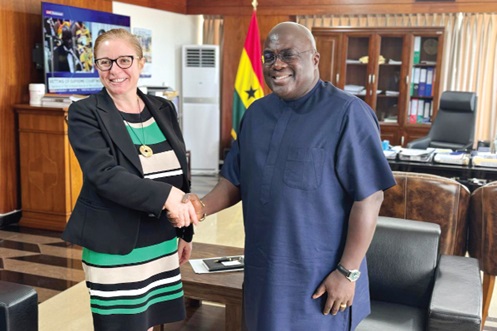Italy converts 70% Ghana debts to grants

Italy has converted nearly 70 per cent of its concessional loans to Ghana into grants in what is considered a significant boost to the local economy.
The gesture wipes off 70 per cent of Ghana’s indebtedness to Italy, which ultimately reduces the national debt portfolio.
The Italian Ambassador to Ghana, Laura Ranalli, who made this known during a courtesy call on the presidency, said the move was a demonstration of Italy’s commitment to support Ghana’s economic recovery and long-term growth.
Ms Ranalli posited that Italy recognised the economic challenges Ghana had faced in recent years, and expressed the belief that easing the country’s debt burden through the conversion of loans to grants would create the fiscal space for development.
“This is a sign of Italy’s enduring partnership with Ghana. About 69 per cent of concessional loans have now been turned into grants.
“This is our way of supporting Ghana’s stability and growth,” she said.
The Italian Ambassador further cited significant Italian investments in Ghana’s health sector, citing an agro-industrial company operating in the Volta Region that had committed over €77 million to healthcare and related initiatives.
Visit, Aqaba Process
As part of the visit, Ms Ranalli presented a special invitation from the President of Italy, Sergio Mattarella, to President John Dramani Mahama to participate in the upcoming Aqaba Process Forum in Rome from July 22–24, 2025.
The Aqaba Process is an informal high-level discussion forum, launched in 2015 and chaired by King Abdullah II of Jordan.
It aims at enhancing global coordination and cooperation to counter terrorism and violent extremism.
It brings together political, military and security leaders from around the world to share experiences, intelligence and strategies.
The process focuses on fostering regional and international collaboration, especially in conflict-prone areas such as the Middle East and Africa.
It emphasises early warning, de-radicalisation and cyber-threat mitigation, while also supporting frontline states.
Aqaba Process meetings are often discreet, fostering frank dialogue and practical partnerships against evolving terrorist threats.
The 2025 edition will focus on West Africa, and Ghana’s participation is seen as crucial due to its growing role as a regional anchor of peace and democracy.
Peace, appreciation
In that vein, the Ambassador, who is yet to present her letters of credence to President Mahama, praised Ghana for being a cornerstone of peace and security in West Africa, highlighting its stabilising role in the sub-region.
She further emphasised that Ghana’s participation in the Aqaba Process would be vital to address regional threats and fostering international cooperation on peace and security in West Africa.
The Chief of Staff, Julius Debrah, who received the invitation on behalf of the President, expressed appreciation to the Italian government for its unwavering support.
“We are grateful for Italy’s continued support, especially the decision to convert loans to grants, which goes a long way to ease the pressure on our economy,” Mr Debrah said.
He appealed for sustained cooperation between the two countries, and assured the Ambassador of President Mahama’s commitment to ensure that any support from the international community was used transparently and effectively for national development.



